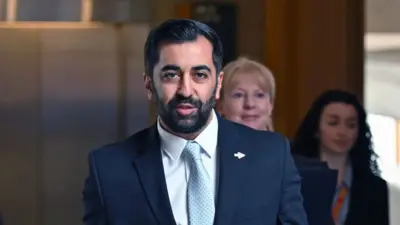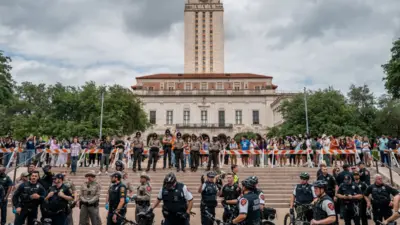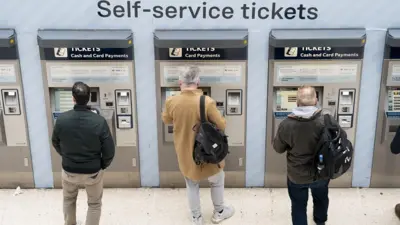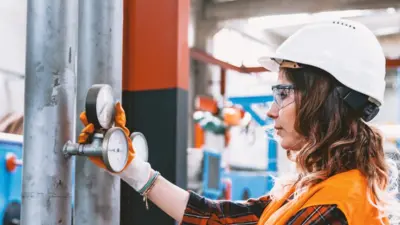We've updated our Privacy and Cookies Policy
We've made some important changes to our Privacy and Cookies Policy and we want you to know what this means for you and your data.
Crystal Palace Stadium: Former home of athletics 'managed to disrepair'
- By Rebecca Cafe
- BBC News
Image source, Getty Images
A stadium that was the home of British athletics for decades and where legends including Usain Bolt competed is being "managed into a state of disrepair".
Crystal Palace Stadium in south London was closed Friday night over emergency safety concerns.
Greenwich Leisure Limited, which operates the venue, said the concrete pillars that hold up the floodlights were unsafe.
It is not known when the arena will be able to reopen.
Image source, John Gichigi
For years, the stadium, which had a 19,000 capacity, was a fixture on the international stage thanks to its link with British Athletics.
But when the London Olympics took place in 2012, athletic events moved away from Crystal Palace to be held at venues across England.
The stadium hosted its last grand prix event in 2011.
Since then, it has been used as a community sports centre and, according to those who use the site, it has fallen into disrepair.
This article contains content provided by Instagram. We ask for your permission before anything is loaded, as they may be using cookies and other technologies. You may want to read Instagram cookie policy and privacy policy before accepting. To view this content choose 'accept and continue'.
End of Instagram content, 1
The indoor track has leakages; bird, fox and rat excrement are on the outside stands.
An exclusion zone has been set up around the complex and a Christmas light festival - Lightopia - had to shut over the weekend. It is due to reopen on Thursday.
Donovan Reid is a former British sprinter who competed in the men's 100m final in the 1984 Los Angeles Olympics. He now works as an athletics coach and has used the stadium for 30 years.
He said the stadium had been "managed to disrepair".
"To categorise it as a bit of a mess, is like saying the pandemic was a cold. It's more than a bit of a mess," he said.
Image source, AFP/Getty Images
He said there had been a "systematic" closure of the centre during the pandemic, with the swimming pools the first part of the complex to shut.
He added 12 years of projected investment, including two major consultations, had resulted in nothing.
Image source, Getty Images
Last year, it was announced that the swimming pools would be redeveloped. Work has not begun.
"We would love it if work to make it safe can be done and then they can start its development. What we don't want is for someone to shut it down completely," said Mr Reid.
"I have young athletes who I believe can make the Commonwealth, Olympic and World teams and their training is being stifled," he said, adding that those athletes could not afford to lose eight years' training.
On Saturday, following the closure, Mr Reid drove 24 of his athletes for 2.5 hours to train at a track in north London, something which he said he was unlikely to do again.
The closure also means there is no longer an athletics stadium in London that can be used for communities; other venues require membership to train in.
Image source, Getty Images
John Powell, chair of Crystal Palace Sports Partnership, said the move was the "latest shambolic act in a pathetic, managed decline".
"It was an iconic sporting venue but now it's being abandoned and left to rot. Nothing solid has been done to resolve the issues.
"A cynic would say that was always on the agenda. Issues come up time and again to stall everything," he added.
The Greater London Authority (GLA), which has overall responsibility for the centre, said it recognised the closures were "very frustrating". It said it was "urgently working with the centre operator and Bromley Council on minimising the impacts of the closures".
Speaking at a Budget and Performance Committee meeting held earlier on Tuesday, Tim Steer, executive director for housing at GLA, said it was working hard to get the pillars taken down as soon as possible so that the areas that were being used could reopen.
He said the sports centre was forecasted to need a £1.2m-a-year subsidy, however this was expected to increase due to energy prices, staffing costs and lower income received while facilities were closed.
He added the GLA was keen to get on with the renovation as quickly as possible so that the subsidy could be decreased over the coming years.
"The priority over the past few years has been to try and establish a significant capital budget to enable the kind of investment into the facility that it needs, and that was the key step taken in last year's budget.
"Capital was made available so there is now potential to do the investment in the facility and hopefully get important bits of it back open," he said.
Mr Steer added the renovation of the swimming pools was a "complicated project on a complex, listed building", which was outside the GLA's usual type of project.
He said design and project management teams had now been appointed following a detailed procurement process and he was hopeful that the "longer-term future for the facility looked better".
"Obviously it's not going to be a quick fix, these projects take time, and we're working really hard on that now," he concluded.
Follow BBC London on Facebook, Twitter and Instagram. Send your story ideas to hellobbclondon@bbc.co.uk
National Sports Centre in Crystal Palace to get renovation funds
An Olympic swimming pool and a diving pool in south London have been closed since March 2020.
Top Stories
Features & Analysis
Most read
Content is not available








